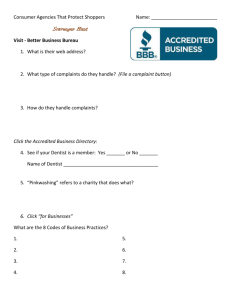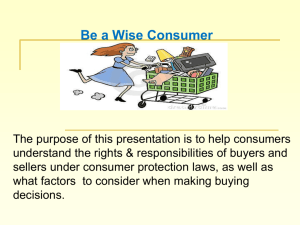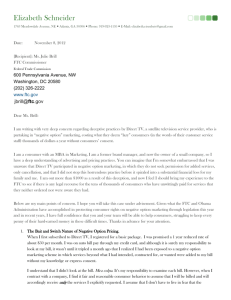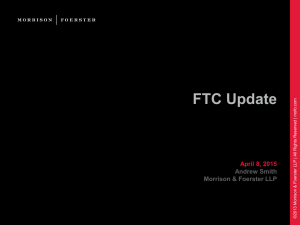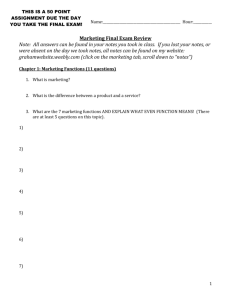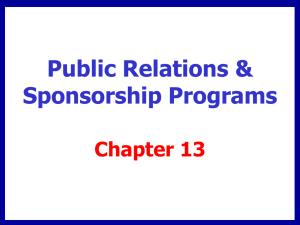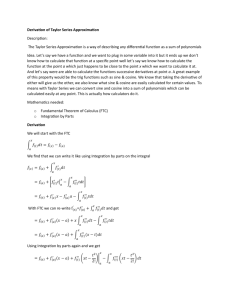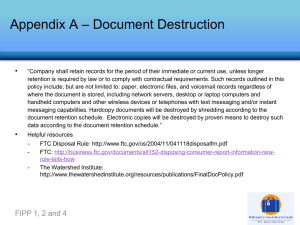Liana Evans
advertisement
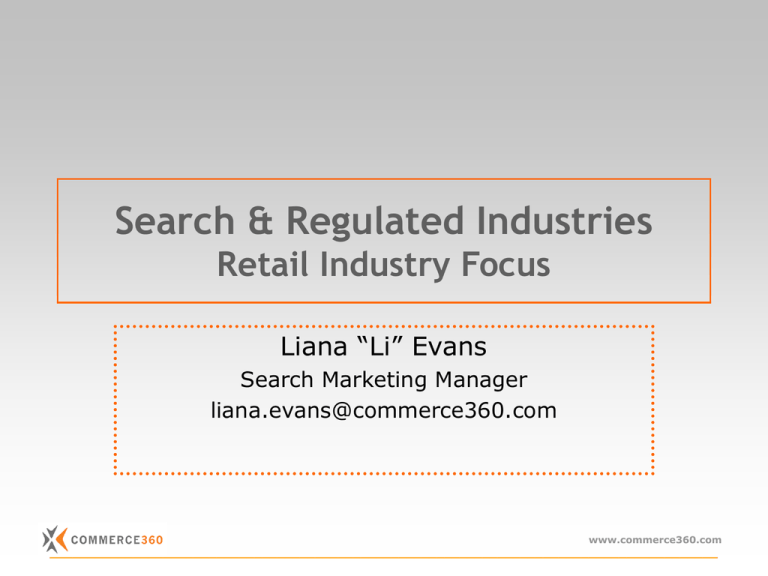
Search & Regulated Industries Retail Industry Focus Liana “Li” Evans Search Marketing Manager liana.evans@commerce360.com www.commerce360.com ________________________________________________________________________________________ Myths! On the Internet I can say anything I want, no one will care! No government entity monitors websites! I’m in retail – there’s no regulations for Online Stores! www.commerce360.com ________________________________________________________________________________________ What the FTC Regulates in Online Advertising Business Opportunities Credit & Financial Issues Dietary Supplements Energy & Appliances Environmental Claims Eye-Care Surgery Food Advertising Free Products Jewelry 900 Numbers Made in the USA Mail & Telephone Orders Multi-Level Marketing Negative Option Offers Telemarketing Testimonials & Endorsements Tobacco Vocational & Distance School Educations Warranties & Guarantees Weight-Loss Products Wool & Textile Products www.commerce360.com ________________________________________________________________________________________ Closer Look at Retail Industries • • • • • • • • • • • Credit & Financial Issues Dietary Supplements Electronic Appliances Food Advertising Free Products Jewelry Testimonials & Endorsements Tobacco Weight-Loss Products Wool & Textile Products Made in the USA www.commerce360.com ________________________________________________________________________________________ Retail Industries & FTC Rules Credit & Financial Issues Retail websites offering their own credit payments, credit card, financial services, etc. must adhere to the FTC’s rules & guidelines: • • • • • • The The The The The The Truth in Lending Act Fair Credit Billing Act Fair Credit Reporting Act Equal Credit Opportunity Act Electronic Fund Transfer Act Consumer Leasing Act Dietary Supplements Websites selling Dietary Supplements (i.e. vitamins) fall under heavy scrutiny from the FTC All Claims must be substantiated. The FTC considers the following when verifying claims: • • • • • Specific Level of Support The Amount & Type of Evidence The Quality of the Evidence The Totality of the Evidence The Relevance of the Evidence Other Issues Monitored by the FTC • • • • Claims based on Consumer Testimonials and Expert Endorsements Claims based on Traditional Use Use of the DSHEA Disclaimer in Advertising Third Party Literature www.commerce360.com ________________________________________________________________________________________ Retail Industries & FTC Rules Electronic Appliances Food Advertising • • • • • Energy efficiency ratings/energy guide information for: Refrigerators, freezers, dishwashers, washers, water heaters, furnaces, boilers, central air conditioners, room air conditioners, heat pumps, pool heaters Online dealers are required to provide: estimated annual energy consumption: refrigerators, freezers, dishwashers, washers & water heaters energy efficiency rating: air conditioners, heat pumps, furnaces, boilers & pool heaters range of estimated annual energy consumption, or energy efficiency ratings, of comparable appliances. Televisions must display the actual viewing size of the screen Nutrient Content Claims Nutrient Content Claim Disclosures Health Claims • • • • • Standard for Substantiation of Health Claims Health Claims for Foods That Contain a Nutrient at a Level That Increases the Risk of a Disease Nutrient/Substance Levels Sufficient to Ensure Meaningful Health Benefits Minimum Nutritional Value for Foods Bearing Health Claims Relevance of Dietary Factors to Claimed Health Benefits LCD, DLP, High Def, etc., must all measure by the horizontal dimension of the actual viewing area www.commerce360.com ________________________________________________________________________________________ Retail Industries & FTC Rules Jewelry • • • • • • • • General Jewelry Misuse of terms: hand-made, corrosion proof, rust proof, vermeil, platinum, iridium, palladium, etc. Misrepresentation as to gold content, silver content, pewter content Misrepresentation of weight & total weight Tobacco • Restrictions include Diamonds, Gems & Pearls Definition & misuse of diamond, gem, pearl, etc. Disclosure of treatments to diamonds, gemstones & pearls Misuse of terms: blue white, brilliant, full cut, real, genuine, precious, flawless, ruby, sapphire, emerald, topaz, birthstone, gemstone, etc. Misuse of terms such as cultured pearl, seed pearl, Oriental pearl, synthetic, & regional designations, etc. Misrepresentation as to cultured pearls. • banning all outdoor and Internet tobacco advertising; excluding human or cartoon figures from all tobacco advertising; limiting tobacco ads to black-andwhite text when they appear in publications with a significant underage readership; banning the use of the name or logo of a tobacco brand on non-tobacco merchandise; prohibiting the use of any nontobacco brand name as a brand name for a tobacco product Labeling Warning labels should be displayed on pages advertising tobacco products Surgeon General’s Warnings o o o o Smoking Causes Lung Cancer, Heart Disease, Emphysema, And May Complicate Pregnancy. Quitting Smoking Now Greatly Reduces Serious Risks to Your Health. Smoking By Pregnant Women May Result in Fetal Injury, Premature Birth, And Low Birth Weight. Cigarette Smoke Contains Carbon Monoxide. www.commerce360.com ________________________________________________________________________________________ Retail Industries & FTC Rules Weight-Loss, Diet Products Websites selling Weight Loss/Diet products fall under heavy scrutiny from the FTC All Claims must be substantiated. Red Flags the FTC looks for in advertising: • • Cause weight loss of 2 pounds or more a week for a month or more without dieting or exercise Cause substantial weight loss no matter what or how much the consumer eats Cause permanent weight loss (even when the consumer stops using product) Block the absorption of fat or calories to enable consumers to lose substantial weight Safely enable consumers to lose more than three pounds per week for more than four weeks Cause substantial weight loss for all users Cause substantial weight loss by wearing it on the body or rubbing it into the skin Wool & Textiles The Textile and Wool Acts requires advertisers to: • • • • Include a fiber content statement. disclose country of origin information in Internet ads that sell textile & wool products. The description of each advertised item must include a statement that it was made in the U.S.A., imported or both. Ads that say or imply anything about fiber content must disclose the generic fiber names in order of predominance by weight. Other Issues Monitored by the FTC Claims based on Consumer Testimonials & Expert Endorsements Claims based on Traditional Use FTC has a special website for consumers to understand deceptive and bogus weight-loss advertising: http://www.ftc.gov/redflag www.commerce360.com ________________________________________________________________________________________ Additional Retail Issues Free Items A product that's advertised as free if another is purchased "buy one, get one" indicates that the consumer will pay nothing for the one item and no more than the regular price for the other. Ads like these should describe all the terms and conditions of the free offer clearly and prominently. Testimonials & Endorsements Made in the USA A product has to be "all or virtually all made in the United States" for it to be advertised or labeled as "Made in the U.S.A." Testimonials and endorsements must reflect the typical experiences of consumers, unless the ad clearly and conspicuously states otherwise. A statement that not all consumers will get the same results is not enough to qualify a claim. Testimonials and endorsements can't be used to make a claim that the advertiser itself cannot substantiate. Connections between an endorser and the company that are unclear or unexpected to a customer also must be disclosed, whether they have to do with a financial arrangement for a favorable endorsement, a position with the company, or stock ownership. Expert endorsements must be based on appropriate tests or evaluations performed by people that have mastered the subject matter. www.commerce360.com ________________________________________________________________________________________ FTC Regulations The same consumer protection laws that apply to commercial activities in other media apply to online advertising and commercial websites. If you can’t do it in print, on the radio or on television – then you can’t do it online either! The FTC Act's prohibition on 'unfair or deceptive acts or practices' encompasses Internet advertising, marketing and sales. That means – paid advertising, shopping comparisons, banner ads, content, pop-up ads, etc. Many FTC Commission rules and guides are not limited to any particular medium and therefore, apply to online activities. Disclosures that are required to prevent an ad from being misleading, must be clear and conspicuous. If you need disclosures – make sure they are easy for your viewers to find/access. FTC rules & guides that use specific terms—"written," "writing," "printed" or "direct mail"—are adaptable to web pages & online advertising. The FTC concludes that visual text on web p ages and emails fall under these rules & guides FTC rules & guides on "Direct mail" solicitations, are applicable to email. The FTC considers email, just like direct mail – all rules & guides apply www.commerce360.com ________________________________________________________________________________________ Points Webmasters & Agencies Should Keep in Mind Sellers are responsible for claims they make about their products and services. Third parties such as advertising agencies or website designers also may be liable for making or disseminating deceptive representations if they participate in the preparation or distribution of the advertising, or know about the deceptive claims. Advertising agencies or website designers are responsible for reviewing the information used to substantiate ad claims. Advertising agencies or website designers may not simply rely on an advertiser’s assurance that the claims are substantiated. In determining whether an ad agency should be held liable, the FTC looks at the extent of the agency’s participation in the preparation of the challenged ad, and whether the agency knew or should have known that the ad included false or deceptive claims. www.commerce360.com ________________________________________________________________________________________ When in Doubt? Consult the FTC’s website • http://www.ftc.gov Consult legal counsel www.commerce360.com ________________________________________________________________________________________ Resources FTC’s website: http://www.ftc.gov FTC Publications: • • • • • • • • • • Rules of the Road: http://ftc.gov/bcp/conline/pubs/buspubs/ruleroad.pdf Dot Com Disclosure: http://ftc.gov/bcp/conline/pubs/buspubs/dotcom/index.pdf Business Advertising Guidance: http://ftc.gov/bcp/guides/guides.htm Made in the USA Guidance: http://www.ftc.gov/bcp/conline/pubs/buspubs/madeusa.pdf Energy Efficiency Guidance: http://www.ftc.gov/bcp/conline/pubs/buspubs/onlappl.pdf Guidance for Jewelry: http://www.ftc.gov/bcp/guides/jewel-gd.pdf Textiles, Wool & Apparel Issues: http://www.ftc.gov/os/statutes/textilejump.htm Tobacco Guidance: http://ftc.gov/bcp/menu-tobac.htm#bized Diet, Health and Fitness Guidance: http://ftc.gov/bcp/menu-health.htm#bized Fair Packaging & Labeling Act: http://ftc.gov/os/statutes/fplajump.html Liana Evans – liana.evans@commerce360.com www.commerce360.com ________________________________________________________________________________________

